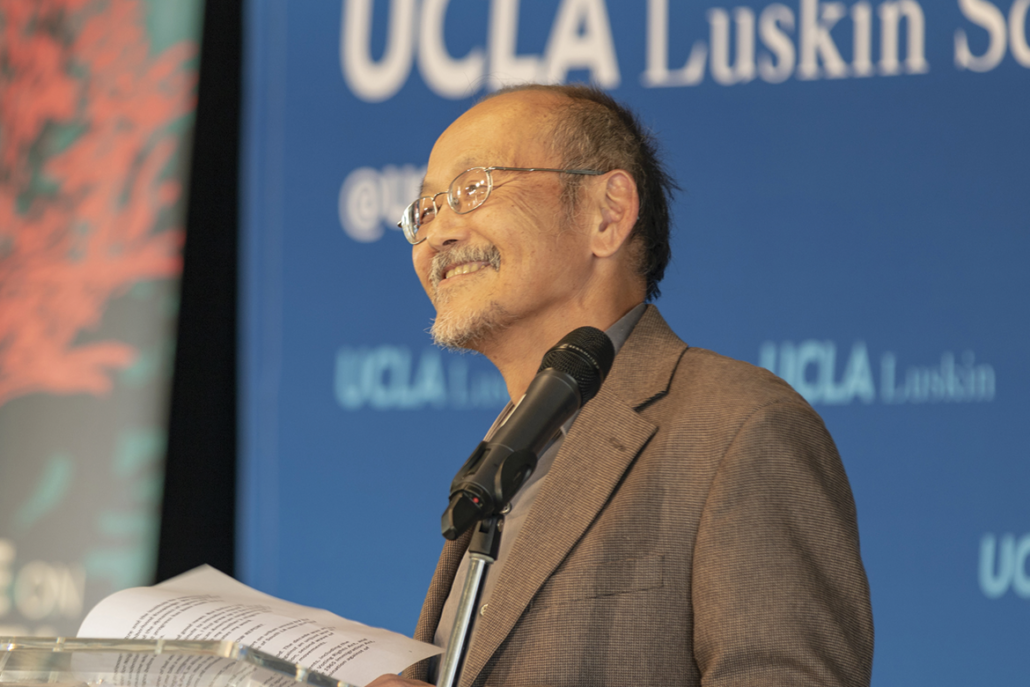By Mary Braswell
Former Gov. Jerry Brown shared his views on stepping up the fight against COVID-19 and repairing the rifts that divide Americans during an expansive conversation with Jim Newton, editor of UCLA’s Blueprint magazine and author of a new book on the California statesman’s life.
More than 1,300 viewers tuned in to the May 12 webinar to hear insights from Brown, who built a reputation as both pragmatist and visionary in his half-century of public service, including four terms at the state’s helm.
The virtual audience had the opportunity to pose questions during the hour-long session, organized by the Los Angeles World Affairs Council & Town Hall and the nonprofit Writers Bloc, in partnership with the 2020 UCLA Luskin Summit.
The webinar took place amid a nationwide debate about how best to contain the novel coronavirus. Newton, author of the new biography “Man of Tomorrow: The Relentless Life of Jerry Brown,” asked the former governor how he would balance the dueling imperatives of protecting the nation’s health and reviving its economy.
Singling out Taiwan as a nation that acted swiftly and effectively to curb the virus’ spread, Brown urged that anyone infected be quarantined away from their families. The urgency of widespread coronavirus testing cannot be underestimated, he said, faulting the federal government for failing to mobilize the nation’s resources to fight the virus.
“This is a great manufacturing powerhouse, we’re a great biotech innovative powerhouse as well,” he said. “So the fact that we don’t have the tests we need, not by the hundreds of thousands but by the tens of millions every day, is leading to the problem we’re now at.
“The longer you wait, the harder it is, the more people get sick, suffer and die,” Brown said.
To rebuild the economy, the former governor invoked the words of Franklin Delano Roosevelt, who called for “bold, persistent experimentation” in his New Deal package of relief and reforms following the Great Depression.
“We need that. Not partisan rancor, not petty politics, not halfway measures. To get this economy going with so many people sequestered at home requires massive federal spending and investment,” Brown said.
He called for the immediate launch of ambitious infrastructure projects to reopen hospitals, bring internet access to rural areas, and build roads, highways and high-speed rail. The projects, he said, would be staffed through a jobs program that would provide a livelihood for millions of Americans now facing prolonged unemployment.
“I would call this really a Rooseveltian moment. And it ought to take into account all the problems that we have. Whether it’s the maldistribution of income and opportunity, whether it’s the pending challenge of climate disruption, all these things are on the table,” he said. “Unfortunately, if we can’t do them right in calmer days, it’s going to be very difficult.”
Known for sprinkling his comments with historical references, Brown cited Roosevelt numerous times and also namechecked economists John Maynard Keynes and Friedrich August Hayek, inventor and architect Buckminster Fuller, and Supreme Court Justice Edward Douglass White, who served in the early 20th Century.
But the names most cited were Donald Trump and Mitch McConnell, the president and Senate majority leader whom Brown held accountable for both an inadequate COVID-19 response and a fractured populace.
“If the choice is Trump for another four years … all these problems, from my vantage point, are going to get much, much worse, dangerously so,” Brown said, looking ahead to the November election.
“We have a lot of challenges and probably the biggest is building trust in our leadership, which is now being done better by our governors than by those occupying a power pole position in Washington,” he said.
Brown, a longtime Democrat whose own presidential aspirations fell short, predicted that an era of greater national unity lies ahead — but it requires abandoning far-reaching proposals from both the political left and right.
“I think we do need a unifier. I know we need polarization to activate the electorate, but in governing we need someone who reaches beyond the particular issues that are currently the stuff of campaigning,” Brown said.
“And that’s why politics is not all that satisfying and why politicians are not enduringly popular.”
Fielding audience questions, Brown weighed in on a range of topics.
On the future of financing higher education in California, he said, “We need to change the university from being an arms race of amenities to one that will be more limited but also fully creative. … The current course is not sustainable without a rising burden put on students, and I think that would be very wrong.”
On his signature issue, combating climate change, he called for an era of “planetary realism” and noted that the coronavirus emergency offers a sober lesson: “If you delay, if you don’t seize the moment when you can, you pay a much bigger price.”
And on maintaining hope amid an array of global threats, Brown took a poetic turn:
“I look out the window here and the wind is blowing on the walnut tree in front of me, the oak trees, the leaves, they’re flourishing” even amid drought, he said. “The rabbits are running around, the dogs are chasing the squirrels, the coyotes are howling at night. …
“Life — just to be here and be part of it — is quite a lot. So to worry, to think about down the road how it’s going to turn out? That’s fortune telling. That’s ouija board stuff.
“Do what you can do in the moment that you have. And God will take care of the rest.”


